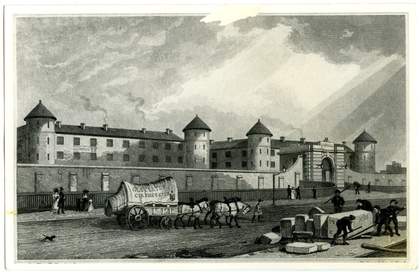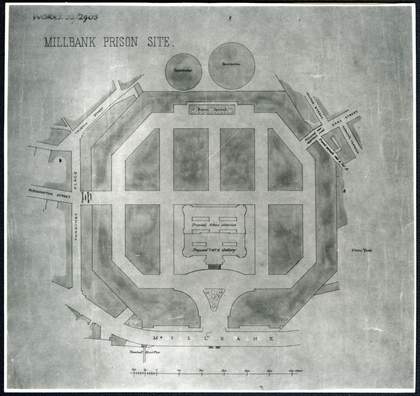
Engraving of the Penitentiary, Millbank, on the site of the present Tate Gallery Tate Archive
I’m Jane Kennedy and I’m the Records Manager at Tate. I enjoy researching the places where I live and work, focusing particularly on aspects of Westminster’s history.
When I was first at Tate, I was taken on an interesting guided tour of the site and surrounding area by a colleague, Krzysztof Cieszkowski. He explained that there had been a prison on the site of Tate Britain from 1816 to 1890. The prison extended further along Millbank from the site of corner galleries of Tate Britain in the east, to the far side of Erasmus Street in the west and northwards into the Millbank Estate, and then southwards, almost to the river. If you walk down John Islip Street towards Vauxhall Bridge Road, you can still see the remains of the moat (the paved alley way with the lamp post and bollards) which surrounded the prison on your right, behind Wilkie House.

Drawing of the Prison Site at MillbankTate Archive Photograph Collection
The prison staff lived in the very desirable residences which can still be seen today in Ponsonby Place, and their local pub was the Morpeth Arms (which is now Tate Britain’s local pub, too). The conditions for the prisoners were not quite so good! Henry James visited the prison, which was called the Millbank Penitentiary, and in his book, The Princess Casamassima (1886), described it as:
From the continuing account in his novel, it was even worse inside the prison. It was described as having ‘high black walls whose inner face was more dreadful than the other’, ‘grey, stony courts’, ‘steep unlighted staircases’ and ‘circular shafts of cells’. Some of the inmates were described as ‘dreadful figures, scarcely female.’
Krzysztof also took me down to the river, where several capstans are located to which the prison ships were moored. After 1842, Millbank was no longer used as a reformatory prison but accommodation for convicts who had been sentenced to transportation to Australia. Convicts were transported to Australia from the late 18th century until 1857 when courts needed a punishment which was not as extreme as hanging but more harsh than a fine. It is alleged by some people that the term ‘POM’ originated from the convicts’ temporary status as ‘prisoners of Millbank.’
If you would like to find out more about the prison, try typing ‘Millbank penitentiary’ into the catalogue of The National Archives for details of records.
